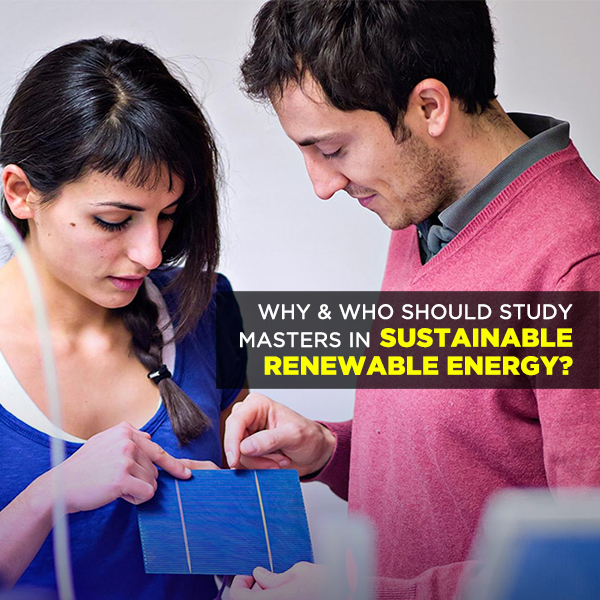
Why & Who should study Master’s inSustainable/Renewable Energy?
With the industrial revolution and technology advancements, the focus has shifted towards power generation. Moreover, because of the exponential growth of the population and since the increase in power generation is directly related to the progress of the country, all nations are striving for the same without moving towards fossil fuel sources. Renewable energy sources are those which do not deplete after being used. Popularly known sources include hydropower, solar energy, wind energy, biomass and tidal energy. These are also called sustainable sources as they help maintain an
ecological balance without depletion of natural resources.
These courses are not just trending in almost every corner of the world but also required due to the Paris Agreement where all compliant countries are parties to the United Nations Framework Convention on Climate Change and will set course towards sustainable development and a low-carbon future. The students who have a background in engineering sectors like mechanical, electrical, chemical, or science domains like physics or chemistry can look forward to pursuing a course in renewable energy. Though all the countries have these courses because of a growing trend, a few of them are ahead of the rest not just in terms of research but their application as well.
This country is one of the most technologically advanced countries and therefore it occurs as one of the major nations focusing on renewable energy. One of the major electric automobiles company ‘Tesla’ has also moved in solar PV business and is encouraging residential as well as commercial complexes to move off-the-grid system by generating their own power using rooftops. Other than solar PV, it also has a focus on wind energy. Top universities focusing on renewables are UC Berkeley, UT Austin, MIT and Stanford.
This country is considered to be the hub of mechanical engineers in the world. The universities, therefore, have renewable energy courses, closely related to the mechanical stream. For a country where around 78% of the electrical demand is met by renewables, the emphasis is very clear to spend on these sources to move towards a sustainable future. The top universities with an intent to spread this knowledge are TU Berlin, TU Munich, SRH Heidelberg, and Hamburg University of Applied Sciences.
- Denmark
This country is actively working towards becoming a 100% fossil-fuel-free country and created a world record by producing 42.7% of their electrical needs from wind power. It has set a target to use 100% renewables in the Energy and Transportation sectors by 2050.
- Sweden
This country is boosting investments in the fields of clean technology and renewable energy to set an example throughout the world. The top renewable sources used in the country are hydropower and bioenergy which is contributed by a rich supply of moving water and biomass. Other green energy sources used in the country are wind power, solar energy, and heat pumps.
This country generates more power from wind farms rather than coal power plants. Other than wind energy, it also has given priority to solar energy and bioenergy. It provides world-class education and research in these fields.
- Netherlands
The leading renewable sources used in the Netherlands are biomass, wind, solar and geothermal energy. The Dutch Central Government plans to reduce the emission of greenhouse gases to zero by 2050. Their 2023 plan includes making 16% energy used in the Netherlands sustainable. Therefore, many leading Universities including Eindhoven University of Technology, University of Twente and Delft University of Technology provide excellent program related to the field.
Other countries who have focused on renewable energy are Norway and Canada. Norway generates over 99% of its electrical power from hydropower and it also has one of the highest rates of electric vehicles ownership on the planet. The top renewable sources used in Canada are hydropower, wind energy, and biomass with the fast growth of solar PV as well. Iceland is a leading country in the usage of geothermal energy where it facilitates 25% of the total electricity production. With most of the countries moving towards a sustainable future, more research will be required to not just find new sources but also make the current usage more efficient. Please contact us to know more and get your profile evaluation for applying to this program.
Mr. Rahul Bhat
Sr Counselor



